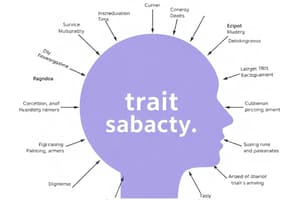Podcast
Questions and Answers
What is personality?
What is personality?
- A set of psychological traits and mechanisms that are organized and relatively enduring (correct)
- A set of unrelated psychological traits
- A temporary state of mind
- A collection of random behaviors
Define psychological traits.
Define psychological traits.
Characteristics that describe ways in which people are different from each other.
What is meant by psychological mechanism?
What is meant by psychological mechanism?
Processes of personality that often involve information-processing activities.
What does person-situation interaction focus on?
What does person-situation interaction focus on?
A strong situation refers to circumstances where nearly all people react differently.
A strong situation refers to circumstances where nearly all people react differently.
What does situational specificity refer to?
What does situational specificity refer to?
Define reliability in psychological measurement.
Define reliability in psychological measurement.
What is validity?
What is validity?
Explain generalizability.
Explain generalizability.
What are response sets?
What are response sets?
Define social desirability.
Define social desirability.
What are the 4 sources of personality data?
What are the 4 sources of personality data?
What is self report data (S)?
What is self report data (S)?
What is observer report data (O)?
What is observer report data (O)?
Define test data (T).
Define test data (T).
What is life outcome data (L)?
What is life outcome data (L)?
What is test-retest reliability?
What is test-retest reliability?
Define internal consistency reliability.
Define internal consistency reliability.
What is inter-rater reliability?
What is inter-rater reliability?
What does face validity refer to?
What does face validity refer to?
Define predictive (criterion) validity.
Define predictive (criterion) validity.
What is convergent validity?
What is convergent validity?
Define discriminant validity.
Define discriminant validity.
What is construct validity?
What is construct validity?
What are some measurement issues?
What are some measurement issues?
How to counteract measurement issues?
How to counteract measurement issues?
What are traits?
What are traits?
What are the 2 basic formulations of traits?
What are the 2 basic formulations of traits?
Flashcards are hidden until you start studying
Study Notes
Personality and Traits
- Personality: A combination of psychological traits and mechanisms influencing individual interactions and adaptations to environments.
- Psychological Traits: Characteristics that differentiate individuals and describe their behavior patterns.
- Psychological Mechanism: Refers to the processes behind personality traits, often involving information processing.
Interactionism in Personality
- Person-Situation Interaction: Explores how personality and situational factors interplay to determine behavior, challenging the consistency of traits.
- Strong Situation: Scenarios where most individuals react similarly, limiting the expression of personality.
- Situational Specificity: Behavior varies under specific circumstances, emphasizing the context's influence.
Measurement of Personality
- Reliability: The accuracy of a measure reflecting the true level of a trait.
- Validity: The degree to which a test accurately measures what it claims to assess.
- Generalizability: Validity retained across diverse contexts.
Response Biases
- Response Sets: Unrelated tendencies in answering questions, affecting data integrity.
- Social Desirability: The inclination to respond in a manner perceived as socially favorable.
Sources of Personality Data
- Four Sources: Includes self-report (S), observer report (O), life outcome (L), and test data (T).
- Self Report Data (S): Information provided directly by individuals through surveys or interviews.
- Observer Report Data (O): Insights from third parties observing personality traits in individuals.
- Life Outcome Data (L): Information derived from significant life events observable by others.
- Test Data (T): Behavioral data collected from structured testing environments.
Measurement Reliability
- Test-Retest Reliability: Consistency of test results over repeated administrations.
- Internal Consistency Reliability: The degree to which items on a questionnaire measure the same construct.
- Inter-Rater Reliability: Agreement among multiple observers assessing the same phenomenon.
Types of Validity
- Face Validity: Initial assessment of whether test items appear to measure the intended construct.
- Predictive Validity: Ability of test scores to predict outcomes or criteria.
- Convergent Validity: Alignment with other established measures of the same construct.
- Discriminant Validity: The differentiation between constructs that are not supposed to be related.
- Construct Validity: Overall assessment of what a test measures.
Measurement Challenges
- Response Sets: Patterns of responding unrelated to content.
- Acquiescence Bias: Predilection to agree or say "yes" in responses.
- Extreme Responding: Tendency to give only highest or lowest ratings.
- Moderacy Bias: Preference for middle-ground responses.
- Social Desirability Bias: Adjusting responses to appear favorable.
Counteracting Measurement Issues
- Bias Mitigation Techniques: Use less biased question designs, implement forced-choice formats, and repeat questions to check for inconsistencies.
Understanding Traits
- Traits: Define personal attributes that encapsulate behavioral, emotional, and cognitive patterns.
- Formulations of Traits:
- Internal Causal Properties: Traits viewed as underlying factors driving behavior.
- Descriptive Summaries: Traits described through observable behavior frequencies.
Studying That Suits You
Use AI to generate personalized quizzes and flashcards to suit your learning preferences.




